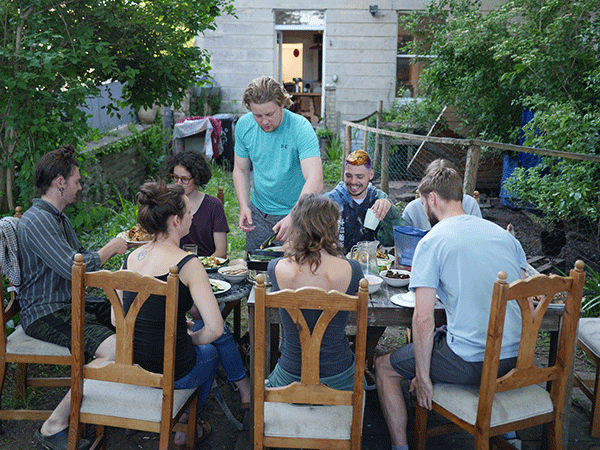I live with seven other people in a large terrace-end house in the heart of Bristol – a city that loves community.
What makes us different to your average house share is that everyone here is intentionally living by the traditional community values of sharing resources, time and energy to collectively create something that we could not have alone. Ultimately, everyone in the house wants to be involved in the world of those around them.
Dinnertime is sacred in our home. It’s the one moment each day where we all connect and it’s an opportunity for each community member to put some time, effort and love into something for the benefit of all.
The need for food connects us even when nothing else will, and our dinnertimes are regularly been full of laughter or laden with philosophical discussion. It’s always a joy to invite others into that space and we regularly expand our small community with guests of all kinds.
Cooking dinner isn’t simple here though, given that we have had a self-professed carnivore, a vegan, a strict low-carb eater, and two people with significant food intolerances. There’s a lot to keep track of, and each person has in some way been required to give way to the needs or preferences of others regarding food. For me this is the essence of community.

Choosing what we buy and consume creates ongoing discussion in the house, but given that we are a community based on the principles of Christianity, more often than not the ethical choice prevails.
Using Riverford’s organic produce was the first obvious decision (given that I work for the company) which then opened the table for discussion around where we get everything else.
Now we use different shops for different items to find more organic and Fairtrade options, try to minimise plastic, use a sustainable toilet roll supplier and even bought our own chickens to supply most of our eggs (one of the more extreme examples).
Truly though, the hens have given us so much more than eggs. They have been a community project from the beginning, with some of us designing and building their living space, each house member naming a chicken and all of us taking ownership over their care.
In a society as individualistic as the UK, living in a community provides a challenging but rewarding alternative to the norm. It is a decision to focus less on your own desires, and more on the needs of those around you; a decision to give away some control and take on some responsibility; a commitment to people to whom you owe nothing, and a leap of faith in others.
It can be a bit intense for some, but those that leave do so with more friends than they arrived with. More people will come, and many people stay for years.
Although all of us had different ideas and motivations for living in this way but we all agree on the benefits. By opening our lives up to one another we gain friendship and support; open our minds to new ideas; learn new skills and ways of doing things; increase our understanding of others; and grow as individuals much faster than we could otherwise.
In a year when so many people have been shut off from the opportunity to develop relationships, participate in group activities, or sit and eat with friends, I feel incredibly fortunate to have found this place and these people (chickens included!).















Thank you Sam for sharing your experience. I have been “preaching” that the way forward to our society is community living/ecovillages. I spent some time in an Ashram in India many moons ago, and it really changed my view on life and my place in the universe. Keep sharing! I look forward to reading more. Thank you!
I love this idea and always have done since I was a teenager. If my circumstances change I will look to join one myself. I hope these community living households keep growing.